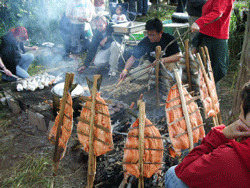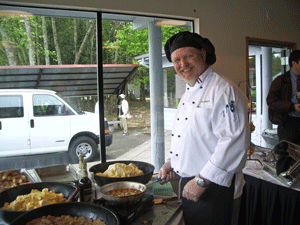
Culinary
School Vs. Community Education Many people believe that in order to be considered an “expert” on food, you must have attended some kind of culinary school. A culinary education can be achieved in many different manners, and depending on your desired outcome, it can be very important where you receive that education. Before you sign up for your cooking school, determine your reasons and what you plan to achieve in the end. This becomes a form of goal setting and a realization of where you would like to see yourself in the future. You may be surprised at what is really important to you. Usually people who want to attend culinary school are there for one of four reasons: 1) Culinary Career – this means working their way through the ranks and ultimately want to become an Executive Chef or higher or own their own restaurant. Usually the younger generation right out of high school, or older people re-educating themselves for employment who need a degree for a different career. 2) Existing cooks and food service people who want to break into management in the future with a required degree. Already have experience in the kitchen, but need the paper and credits to add to their resume. 3) People who love to cook already but not professionally and want to expand their abilities. Possible future business owners or someone following a dream of a catering company on the side or being the person in the community that can help out or plan and event. Not looking to work for someone else. 4) Personal Development – Always wanted to be able to cook, impress the opposite sex, or develop some survival skills that could make eating more than just a chore. Pretty much on a basic level with no desire to go into the food service arena. Each of these individuals have a perfectly legitimate reason for going to school and will accomplish their goal if they do … BUT, there are different levels of school and different levels of pricing that can really make a difference unless you are someone that has deep pockets (lots of money) and has loads of spare time to kill. If you just want to have some classes to eat better like in example #4, think about community education at your local college that has specific courses. I taught those classes for years and many of my students lost the fear of cooking and became quite proficient at entertaining on their own. The cost of individual classes is usually about $45-50 each or sometimes they have a package. Many chefs and existing business owners took my classes for expanding their garnishing abilities in fruit carving or to learn another form of cuisine. Specialty classes are NOT usually something you will learn in a formal 2 year Culinary School. They contain condensed specific topics that are intended to target a given subject. The Culinary 2 year degree Let me tell you first of all what a culinary degree really is. At the end of your normal two year college experience, you’ll have a ATA degree that certifies you as a “Line Cook”. You are not a chef, but qualified to find a position at a food establishment working a stove, making salads or serving tables. There are specific Modules that you will learn in school and based on your competency and level of comfort will give you basics. But, a “Certified Line Cook” is the “Official” rating you will receive. Many people believe that you MUST pick the renown colleges in order to get the best education. That is not true, granted there are some that are better than others, but many culinary programs offered by junior colleges out teach the big names. Also in competitions, it is interesting how many times the small schools beat the big ones. Let me explain what I’m saying, in reality, your education is as good as the time you put in and the effort to learn all you can. If a smaller school offers more hands on time and better class sizes than the big ones, you are going to learn more if you take advantage of every opportunity. Let me give you some examples: 1) Some specialty big name schools offer a 4 day week, with one day of cooking and 3 days of classroom education. The reason there is only one day of cooking is due to the expense of food to the school. The students usually eat the food, so most class time is demo or book. 2) Small community school with good program. Offer a 4 day week, mornings consist of a couple hours instruction and afterward consist of hands on cooking. 1st year students cook for the cafeteria and 2nd year students cook for the school restaurant. 3) Larger school with more culinary students. Same problem with waste of food, no place to sell that much food, so cooking time is limited, but also class room numbers are higher. Great atmosphere for students and teachers, but nightmare for costs to management and actual student learning is decreased. Frequently on the level of a high school mentality due to the large number of students coming directly from high school. 4) Smaller community college controls the number of students. Sets up standards that have to be met before being admitted. Smaller class sizes means more time with the instructor or under instructor’s care. The difference in cost between the big name school and the community college is also very significant. You can pay over $36,000+ for 2 years at the big schools. There are some scholarship opportunities, but limited. Community College Culinary School runs about $10,000 for the 2 years. Scholarships and grants available through state and fed government depending on income really make a difference for the student that investigates their options. Many receive grants for the complete education. You have to do your homework when it comes to individual schools. You do want to make sure that whichever school you pick is a certified school by the ACF (American Culinary Federation). This is the standard of the industry. It is well worth your time to be a member and as a student they have a discounted membership. When looking for work in the future at various large corporations, this will make a difference if they understand their business. The reason for this is that the ACF creates set standards of ability that puts all graduates on a level of competency. Once again, what you put into your education will make a difference in the long run. Why get a degree? A degree CAN be something that allows you to get an interview at a location of your choice because you were able to put it on paper in your resume. Hopefully it will impress someone that you took the time to learn what you can. Once you have your interview and an opportunity to show them what you can do, it will be your ability that will keep you there or allow you to advance to different levels in the food industry. No matter what school you choose to attend, remember also that your actions will either help or damage the opportunities for the next applicant. If you do poorly in your interview or job performance, it will reflect on your school. I know many Executive Chefs and Food and Beverage Managers that won’t hire from a specific school because of bad experience in the past … but then it goes the opposite for a great experience too. You DO make a difference by your attitude, performance and knowledge. Of course you can get a higher degree if you’re looking for management and a real career, but most people looking to educate themselves in the art of cooking are not looking for management.
|










